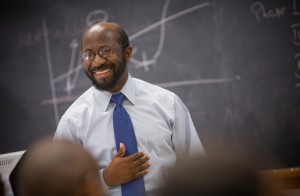
Rexford Ahene
After receiving a master’s in economics from the University of Virginia, Rexford Ahene couldn’t afford to fly home to Ghana. But he couldn’t stay in the U.S. either, because his visa was no longer valid.
“The only option was to go on for a Ph.D.,” says Ahene, whose master’s degree was funded by a grant from the U.S. State Department. So he headed north to the University of Wisconsin — where the cold literally froze the hair off his head — to earn a degree in urban land policy.
At the behest of the World Bank, United Nations, and USAID, Ahene, professor of economics, works to develop land reform policies in developing countries such as Botswana, Tanzania, Uganda, South Africa, Ghana, and Malawi. In each country, Ahene’s role is to balance the needs of the community, national interests, and investors, as well as any demands and conflicts.
That can be a challenge in some African countries where capitalism is still a relatively new concept, and land ownership is often informal and communal.
“Communities have rules defined by tradition and custom,” says Ahene. “As economies are changing and land becomes a valuable asset, governments need to come up with new policies to regulate property while retaining the virtues of the traditional system.”
That didn’t happen during the Colonial Period when foreign powers privatized property by declaring eminent domain, resulting in the displacement of millions of people. “They would pay peanuts and claim it was in the public interest to take the land,” Ahene says. “Without documentation it’s difficult to determine boundaries and rights.”
Ahene is working on a $43 million land management policy in Uganda that includes implementation of an $11.2 million computerized information system to track ownership, boundaries, and geographic attributes of property. The database will be useful to banks, investors, and other financial institutions in establishing ownership prior to issuance of a loan or sale.
The project includes use of a global positioning system to define coordinates that will aid in disaster planning and formation of land policy.
“It’s a way of modernizing the land ownership system,” Ahene says.
He also works with a community-based land development program in Malawi where the homeless and female-headed households are given two acres of land to develop and farm. Since the program was initiated, 80 percent of property owners have quadrupled their incomes, Ahene says.
He has taught classes abroad in the past, but in the fall, he is taking students to Ghana for a semester where they’ll study at the local university and work with farmers to develop business plans and manage their financial resources.
“Students will be involved in the community working with small entrepreneurs to help them understand the economics of business,” he says.
They will also partner with Happy Trail Farms, a 2,000-acre sustainable farm that uses green technology to grow soybeans, maize, yams, and other vegetables. Compost and fertilizer from Happy Trails is then hauled off site and processed into fuel, which then powers the farming operation.
Students will take part in the financial end of the business by conducting investment feasibility studies and assessing the economics of biofuel development. Ahene predicts the experience will afford more than intellectual edification.
“What students discover is that life lived close to nature, as a lot of African communities do, can be simple, beautiful, and clean, and that material deprivation is really a social construct,” he says. “There are people in the U.S. who think they are poor and they’re surrounded by the latest gadgets and have three meals a day, yet they’re so stressed out. People in Africa live in simple shacks with none of the technology we have and are happy and welcoming and very generous. It’s such a sharp contrast. Students begin to reexamine their values and they come back more mature and appreciative of what they have. You can’t teach a better lesson.”
It also helps that Lafayette students are some of the brightest and most respectful around, he says.
“It’s the reason I’ve stayed here for 27 years,” he says. “I love them.”

1 Comment
Comments are closed.